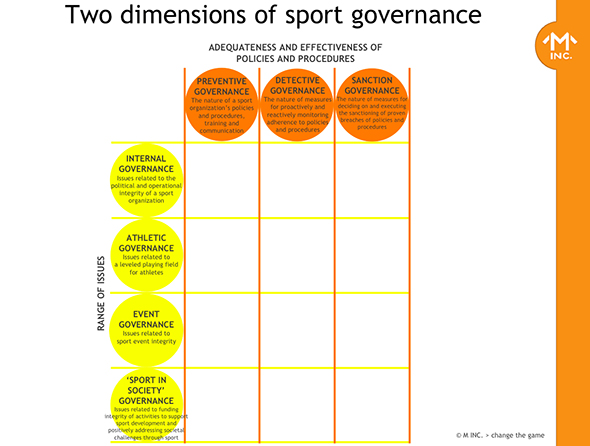The Strategic Importance and Urgency of Good Governance in Sport – Michael Pedersen
October 17, 2016
By Michael Pedersen, capsule internationally recognised expert in good governance, ailment transparency, pharmacy sale ethics and integrity; Founder of M INC.
It is probably fair to say that everybody with a passion for sport is concerned and saddened to see all the continued headlines about corruption, doping, match fixing and other integrity issues in sport. Not only do such headlines take away attention and trust from the beautiful game.
As a result of what is widely seen as sport organisations no longer being fit for purpose, fans, athletes, sponsors, governments and sport organisations are also starting to acknowledge the importance and urgency of bringing about change in the way that sport is governed.
The strategic importance and urgency of good governance in sport
There are several reasons why more and more sport leaders consider good governance in sport as a challenge of strategic importance and urgency, as opposed to just regarding it as the nice thing or the right thing to do.First and foremost, a sound platform of good governance builds trust by enabling strong relationships with key stakeholders of the game.
First and foremost, a sound platform of good governance builds trust by enabling strong relationships with key stakeholders of the game.
Secondly, it builds growth by facilitating increased participation and increased revenues.
Last but not least, it builds performance by attracting and retaining people fit for the task, motivated and supported to perform to their full ability.
More specifically, sport organisations exemplifying good governance benefit from doing so in their engagements and partnerships with key stakeholders of the game in the following ways:
- Athletes (and potential athletes): Sustaining/increasing interest and pride in practising a sport.
- Fans: Sustaining/increasing interest in attending sport events or following them on TV and other media.
- Sponsors and media broadcasters, expecting a positive association through their investments: Sustaining/increasing funding.
- Host governments and intergovernmental organisations: Preempting strict and inflexible regulatory oversight (safeguarding autonomy). Keeping privileges such as tax exemptions. Sustaining/increasing funding.
- Law enforcement authorities: Proactively managing legal liability risks for the organisation and individuals on its board and executive management.
- Auditors and banks: Preempting being seen as high-risk business partners and subsequently sustaining competitive rates for services and full flexibility in choosing among all relevant service providers.
- Civil society organisations, as the most trusted societal players: Preempting critical campaigns and negative media coverage. Sustaining/increasing the level of trust with all stakeholders of the game.

What sport governance is all about:
While more and more people talk about good governance in sport, few agree on what it is actually all about. Appreciating that sport organisations are very different in terms of size, resources and specific challenges across sports and countries, a useful starting point is looking into a number of aspects related to two-sport governance dimensions; range of issues on one hand and adequateness and effectiveness of policies and procedures on the other:
Aspects of the 1st dimension of sport governance: RANGE OF ISSUES
INTERNAL GOVERNANCE: Issues related to the political and operational integrity of a sport organisation, including issues such as conflicts of interest, independent board members, stakeholder engagement, democratic elections, transparency and accountability.
ATHLETIC GOVERNANCE: Issues related to a levelled playing field for athletes, including issues such as doping, match-fixing, betting, equal access to doing sport and equal access to talent spotting and talent development.
EVENT GOVERNANCE: Issues related to sport event integrity, including issues such as selection of hosts, host rights and responsibilities, fair ticket pricing and distribution, selection of sponsors and granting of media broadcasting rights. For big sport events, issues also include positively contributing to addressing critical societal challenges such as human rights, the environment, labor standards and anti-corruption.
‘SPORT IN SOCIETY’ GOVERNANCE: Issues related to funding integrity of activities to support sport development and positively addressing societal challenges through sport, including issues such as fair, equal and transparent allocation and use of funding.
Aspects of the 2nd dimension of sport governance: ADEQUATENESS AND EFFECTIVENESS OF POLICIES
PREVENTIVE GOVERNANCE: The nature of a sport organisation’s policies and procedures, training and communication, including issues such as induction and regular training of board members, staff and volunteers and communication to other relevant internal and external stakeholders.
DETECTIVE GOVERNANCE: The nature of measures for proactively and reactively monitoring adherence to policies and procedures, including issues such as privacy rights, rights and responsibilities of persons under investigation as well as the execution of internal controls like confidential channels for whistleblowing and internal and external audits.
SANCTION GOVERNANCE: The nature of measures for deciding on and executing the sanctioning of proven breaches of policies and procedures, including issues such as privacy rights, rights and responsibilities of persons to be sanctioned and independent decision making of judicial bodies.


